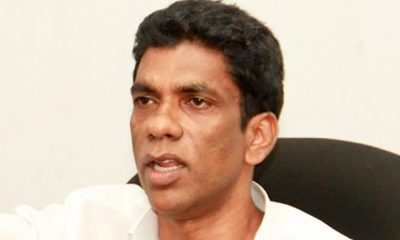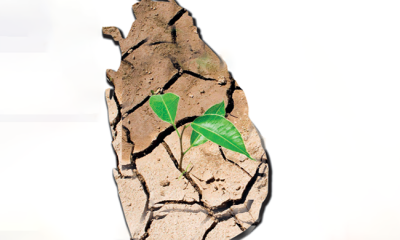Editorial
Lanka’s moment of shame

Monday 3rd July, 2023
Yesterday was a sad day for Sri Lanka. Muthu Raja, an elephant gifted by Thailand about two decades ago was flown back to Bangkok, on Sunday, for treatment as its health had deteriorated owing to alleged neglect and cruelty. Unfortunately, we have had to discuss the majestic beast’s plight, on Esala Full Moon Poya Day, which is holy to Buddhists, who uphold compassion towards animals.
It defies comprehension why no action was taken to ensure that Muthu Raja was treated properly here, and the Thai government was burdened with the task of looking after the animal. Thailand has handled the elephantine issue, as it were, very diplomatically, but in this age and day, when information travels across the globe incredibly fast, there is no way Sri Lanka could prevent Muthu Raja’s suffering from tarnishing its reputation internationally. It has incurred the opprobrium of millions of animal lovers across the globe. Mahatma Gandhi has famously said the greatness of a nation and its moral progress could be judged by the way its animals are treated.
It must have cost a lot of money to transport Muthu Raja back to Thailand for treatment because a massive steel cage had to be built for it and a cargo plane brought all the way from Russia to fly it to Bangkok. Those who are responsible for the poor animal’s suffering and tarnishing the image of the country must be found out, and ordered to bear the cost of the transportation and treatment of the poor elephant besides being made to face the full force of the law for cruelty to animals.
Many Sri Lankan elephants are undergoing suffering at the hands of their owners and handlers at various places including Buddhist temples like the one where Muthu Raja had been kept before being transferred to the Dehiwala animal zoo. The plight of all these animals must be highlighted and their tormentors brought to justice. In fact, no animal is apparently free from cruelty in this predominantly Buddhist country, where hardly a day passes without the killing of a wild elephant being reported.
It has been alleged that someone demanded a huge amount of money to grant permission for Muthu Raja to be taken overseas for treatment. A high-level investigation is called for to get at the truth, given the seriousness of the allegation as well as international media attention it has received.
What’s the world coming to when a bribe is demanded for allowing a sick animal to be taken abroad for treatment?
Muthu Raja has been suffering in this manner because it was used as a gift. Sri Lanka has also earned notoriety for using animals as gifts to please foreign dignitaries. The deplorable practice of giving away animals as gifts must end forthwith; it, we believe, is an anachronism in the civilised world. If Heads of State or other such worthies are desirous of strengthening relations with their foreign counterparts, let them exchange inanimate things without causing suffering to animals!
Animal rights are blatantly violated even inside wildlife sanctuaries in this country. Traffic jams are reported from Yala, of all places; there seem to be more safari vehicles than animals in that famous game reserve, and politicians’ kith and kin gather there for off-road racing. Worse, it has been alleged that animals are killed and sold as bushmeat in the Ridiyagama Safari Park. The Wildlife authorities have sought to dismiss this allegation as baseless, but the disclosure of such illegal activities in that wildlife park has been made by no less a person than a senior veterinarian who worked there; only a thorough probe will help ascertain whether the shocking allegation is true or false.
Sri Lanka has made many laws, all these years, to ensure animal welfare, but the ever-increasing instances of cruelty to animals makes one wonder whether they are actually worth the paper they are written on.
Editorial
A question of power

Saturday 3rd Junuary, 2026
The Electricity Consumers’ Association (ECA) has said the government is planning to pass the cost of the voluntary retirement scheme for the employees of the Ceylon Electricity Board (CEB), which is to be restructured, on to the public in the form of a power tariff hike. A proposal to this effect has been submitted to the Public Utilities Commission of Sri Lanka (PUCSL), the ECA has said.
The proposed tariff hike is said to be 11.57% for the first quarter of the current year. Speculation is rife that the PUCSL will grant the CEB’s request, and the public will be made to bear the cost of the voluntary retirement of about 2,500 CEB employees thanks to the cost reflective pricing mechanism. The problem is not going to end there; there are bound to be some more power tariff hikes.
One of the reasons given for Sri Lanka’s rupee crisis was the country’s legacy of below-cost pricing for utilities, such as electricity and fuel, by way of a ‘blanket’ type relief to consumers irrespective of their income level. These subsidies took their toll on the state-owned business enterprises (SOBEs) including the CEB and the Ceylon Petroleum Corporation (CPC), according to the Central Bank, which in its Annual Economic Review 2024 has noted that the banking sector financed the liquidity shortages of these SOBEs at the expense of productive investments. Hence the determination of the prices of electricity and fuel strictly in keeping with the cost reflective pricing mechanism. In fact, the IMF gave the previous government Hobson’s choice, by making cost-reflective pricing one of its bailout conditions.
The cost reflective pricing has not gone down well with the public, as is obvious, but it makes economic sense and goes a long way towards preventing the country facing another rupee crisis. Heavy subsidies are a drain on the state coffers and become unviable in the long run. In fact, it is a case of swings and roundabouts for the public where such subsidies are concerned; the state uses taxes to recover the costs of subsidies and legacy debts it assumes. However, it is nothing but unfair to make consumers bear the cost of massive overheads, waste and corruption that SOBEs, like the CEB and the CPC, are notorious for. The costs of the utilities must therefore be properly calculated in a transparent manner to prevent the exploitation of the public.
If the government goes ahead with its plan to pass the cost of restructuring the CEB on to the public through power tariff hikes, as the ECA has alleged, then the price of electricity will soar, taking a heavy toll on the economy.
In March 2023, this newspaper quoted energy expert Dr. Tilak Siyamabalpitiya, who went on to become CEB Chairman, as having said at an event organised by the CEB engineers, that Sri Lanka had the second highest electricity prices in Asia. Thus, power tariff increases are very likely to stand in the way of the government’s efforts to attract foreign investors and retain the ones who are already here. One of the factors that determine the competitiveness of investment destinations is the cost of electricity. The government must not lose sight of this fact.
The government has chosen to remain silent on the ECA’s allegation. But the truth will soon come out.
Editorial
It’s PC polls, stupid

Friday 2nd Junuary, 2026
The SJB yesterday called upon the NPP government to hold the much-delayed Provincial Council (PC) polls soon. Its call is bound to go unheeded, for the JVP/NPP is not ready for an election. Having suffered a string of defeats in the cooperative society elections during the past several months, the government is trying every trick in the book to postpone the PC elections further. The outcome of last year’s local government polls is not something the JVP/NPP can be really proud of; its efforts to sweep the polls did not reach fruition although it managed to bag a majority of local councils.
A midterm electoral setback could be the undoing of a government however powerful it may be. The fate that befell the Mahinda Rajapaksa government following the Uva PC polls in September 2014 is a case in point. The UPFA won the Uva PC, but the number of its seats dropped from 25 to 19. The number of UNP’s seats increased from 7 to 13. The JVP, which had only one seat in the previous council, secured 02 in 2014. President Rajapaksa, in his wisdom, advanced a presidential election, and lost the presidency to Maithripala Sirisena in January 2015.
So, it is highly unlikely that the NPP government will hold the PC polls anytime soon. The Opposition is not strong enough to pressure the government politically to take a huge electoral gamble by holding an election.
It is doubtful whether the Opposition is really keen to face an election at this juncture despite its rhetoric. The SJB and other Opposition parties have closed ranks and defeated budgets in a considerable number of NPP-controlled local councils and won cooperative society elections. But their fragile unity is not going to survive an election that they will have to contest separately. A split in the anti-government vote will stand the JVP/NPP in good stead. However, the situation is likely to change if the UNP and the SJB come together to contest future elections.
What enabled the UNP to improve its electoral performance in the Uva Province in 2014 and gain a strategic opening to topple the Rajapaksa government a few months later was a rapprochement between two factions led by Ranil Wickremesinghe and Sajith Premadasa.
The SJB leaders who are demanding that the PC polls be held soon ought to tender an apology to the public for the role they played in postponing the PC elections indefinitely in 2017 while they were in the UNP-led Yahapalana government. The UNP and the SLFP, as Yahapalana allies, were wary of facing an election in 2017 and therefore amended the PC Elections Act to delay the PC polls. None of the political parties represented in Parliament at the time, including the UNP, the SLFP/UPFA, the ITAK, the SLMC, and the JVP, opposed the obnoxious amendment to the PC Elections Act. The current SLPP leaders were dissident members of the UPFA. The original amendment Bill was to provide for a quota of 30% for female candidates on the nomination papers submitted for the PC elections, but it was changed beyond recognition at the committee stage to facilitate the postponement of the PC polls. Article 78 (3) of the Constitution says, “Any amendment proposed to a Bill in Parliament shall not deviate from the merits and principles of such Bill.” But the aforesaid political parties took the bad amendment for granted; the PC polls were made to disappear, as it were.
The incumbent government has said the PC polls will be held under the Mixed Proportional (MP) system. The delimitation of electoral boundaries, which is a prerequisite for holding the PC polls under the MP system, will take about one year, according to the Election Commission. The only way to hold the PC election soon is to legislate for it to be conducted under the existing Proportional Representation system. If the SJB is serious about having the PC polls held soon, it should campaign for amending the PC Elections Act, in Parliament. Let it be urged to fish or cut bait.
Editorial
Trace all missing firearms

Thursday 1st Junuary, 2026
The CID arrested EPDP leader and former minister Douglas Devananda last Thursday in connection with an ongoing investigation into a pistol issued to him by the Army way back in 2001 allegedly ending up in the underworld. It has claimed that information elicited from Makandure Madush, a notorious criminal, led the police to the weapon hidden in a shrub in Weliweriya.
Devananda is one of the battle-scarred ex-Tiger combatants who courageously stood up to the LTTE and helped defeat it. He survived several assassination attempts, including one inside the Kalutara Prison. Devananda’s predicament has gladdened the hearts of pro-LTTE groups beyond measure, as evident from their social media posts.
The pistol in question was reportedly issued to Devananda at the height of LTTE terror; Madush was arrested in 2019 and killed in October 2020, while in police custody. Curiously, the serial number of the weapon remained intact while it was in the underworld.
Madush is long dead, and there is no way the CID’s claims about the firearm at issue can be checked. The CID, which is under two members of the Retired Police Collective of the JVP/NPP, has become the JVP’s rottweiler. The police are all out to protect the interests of the JVP/NPP government; they suddenly ran out of breathalysers when a government MP caused a road accident the other day. A policeman, assaulted by a government MP and his backers recently for conducting a raid on a cannabis plantation, was arrested and interdicted! The police have not arrested a deputy minister and an NPP mayor, charged with fraud.
Now that the CID is busy probing Devananda’s pistol, let it be urged to launch an investigation into thousands of weapons issued by the Defence Ministry to politicians in the second JPV uprising in the late 1980s, and the arms seized by the JVP during that period.
In January 2019, the then Defence Secretary Hemasiri Fernando disclosed that about 4,700 9mm pistols and revolvers had been licensed, but there was no information about those who had obtained them and, worse, some individuals possessed as many as 15 small firearms each! In 2023, the then State Minister of Defence Premitha Bandara Tennakoon revealed in Parliament that the defence authorities had issued about 700 firearms to 154 politicians in the late 1980s, when the JVP went on a killing spree, but none of them had been returned. This figure, we believe, is a gross underestimate.
The National Commission against the Proliferation of Illicit Small Arms, appointed by President Chandrika Bandaranaike Kumaratunga in 2004, dealt extensively with the issue of illegal weapons in circulation in Sri Lanka, as we pointed out in a previous editorial comment. Its survey report contains valuable information, which, however, needs to be updated. Defence authorities should study this document thoroughly and commission a fresh survey on illicit firearms.
The police must go all out to find the illegal firearms used by the JVP during its second uprising. Most of the JVP’s arms caches have not been traced. SJB MP Dayasiri Jayasekara told Parliament on 27 February 2025 that more than 2,000 firearms seized by the JVP between 1987 and 1989 had not been recovered. One may recall that the JVP attacked several police stations and military camps and grabbed many weapons. In April 1987, it seized the arsenal of the Pallekele army camp. Now that the JVP-led NPP has formed a government and launched a campaign to eliminate gun violence, the Defence Ministry and the CID may be able to ascertain information about the firearms used by the JVP in the late 1980s.
Hardly a day passes without incidents of gun violence. Two shooting incidents were reported from the Western Province yesterday. The proliferation of illicit firearms in Sri Lanka can be attributed to several key factors, according to researchers; they include gunrunning, illegal operations carried out by rogue elements in the police and the armed forces, local arms manufacturing, and criminals gaining access to arms caches of the LTTE and the weapons that went missing in the late 1980s.
The police produced 12 suspects before the Colombo Chief Magistrate on March 22, 2019, for having supplied weapons retrieved from some buried LTTE arms caches in Kilinochchi to criminal gangs elsewhere. The LTTE seized firearms from the police, the armed forces and the rival militant groups like the EPDP. It is incumbent upon the police to make a serious effort to trace all illegal firearms. Let that be their New Year resolution.
-

 Sports5 days ago
Sports5 days agoGurusinha’s Boxing Day hundred celebrated in Melbourne
-

 News3 days ago
News3 days agoLeading the Nation’s Connectivity Recovery Amid Unprecedented Challenges
-

 Sports6 days ago
Sports6 days agoTime to close the Dickwella chapter
-

 Features4 days ago
Features4 days agoIt’s all over for Maxi Rozairo
-

 News6 days ago
News6 days agoEnvironmentalists warn Sri Lanka’s ecological safeguards are failing
-

 News4 days ago
News4 days agoDr. Bellana: “I was removed as NHSL Deputy Director for exposing Rs. 900 mn fraud”
-

 News3 days ago
News3 days agoDons on warpath over alleged undue interference in university governance
-

 Features6 days ago
Features6 days agoDigambaram draws a broad brush canvas of SL’s existing political situation

























